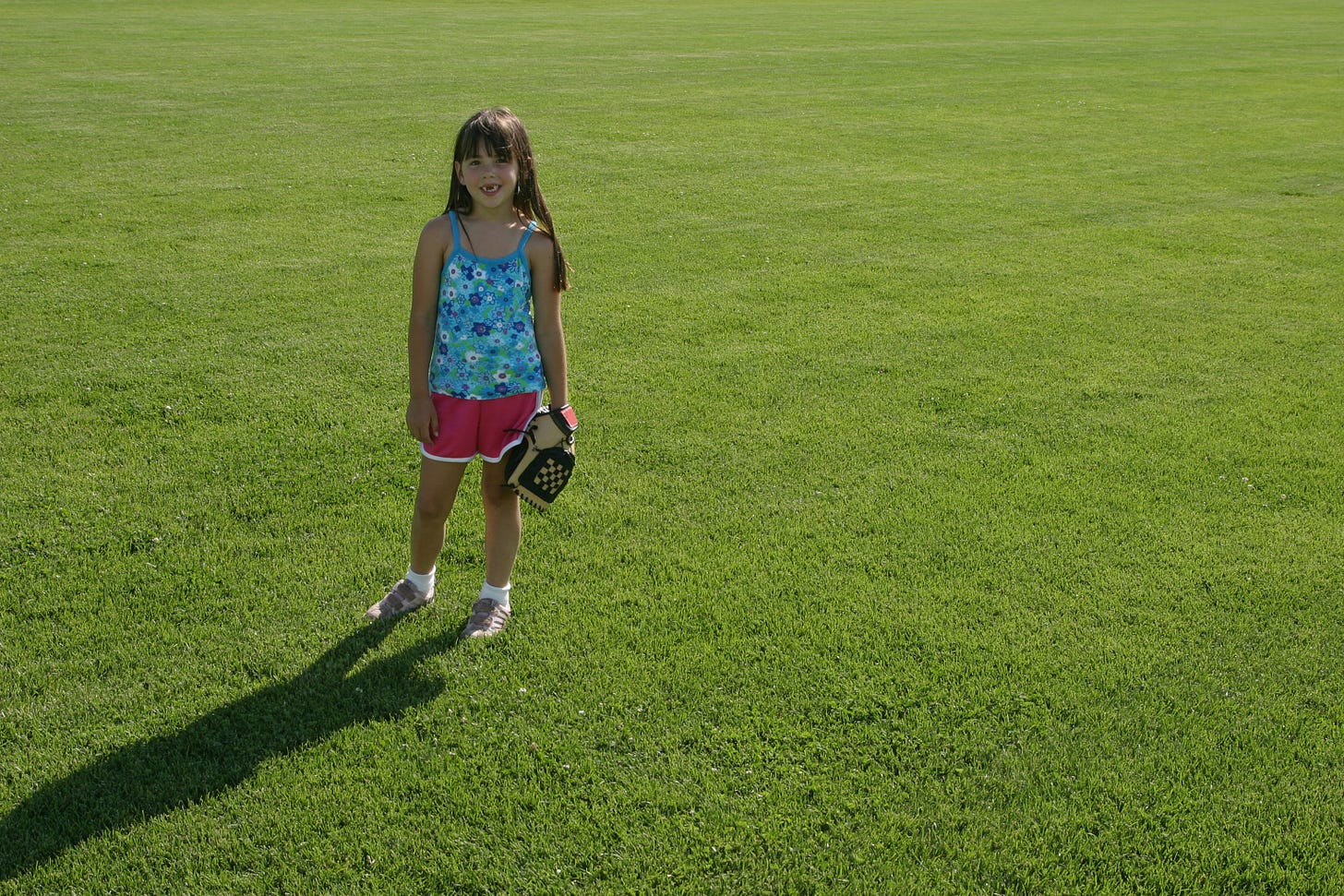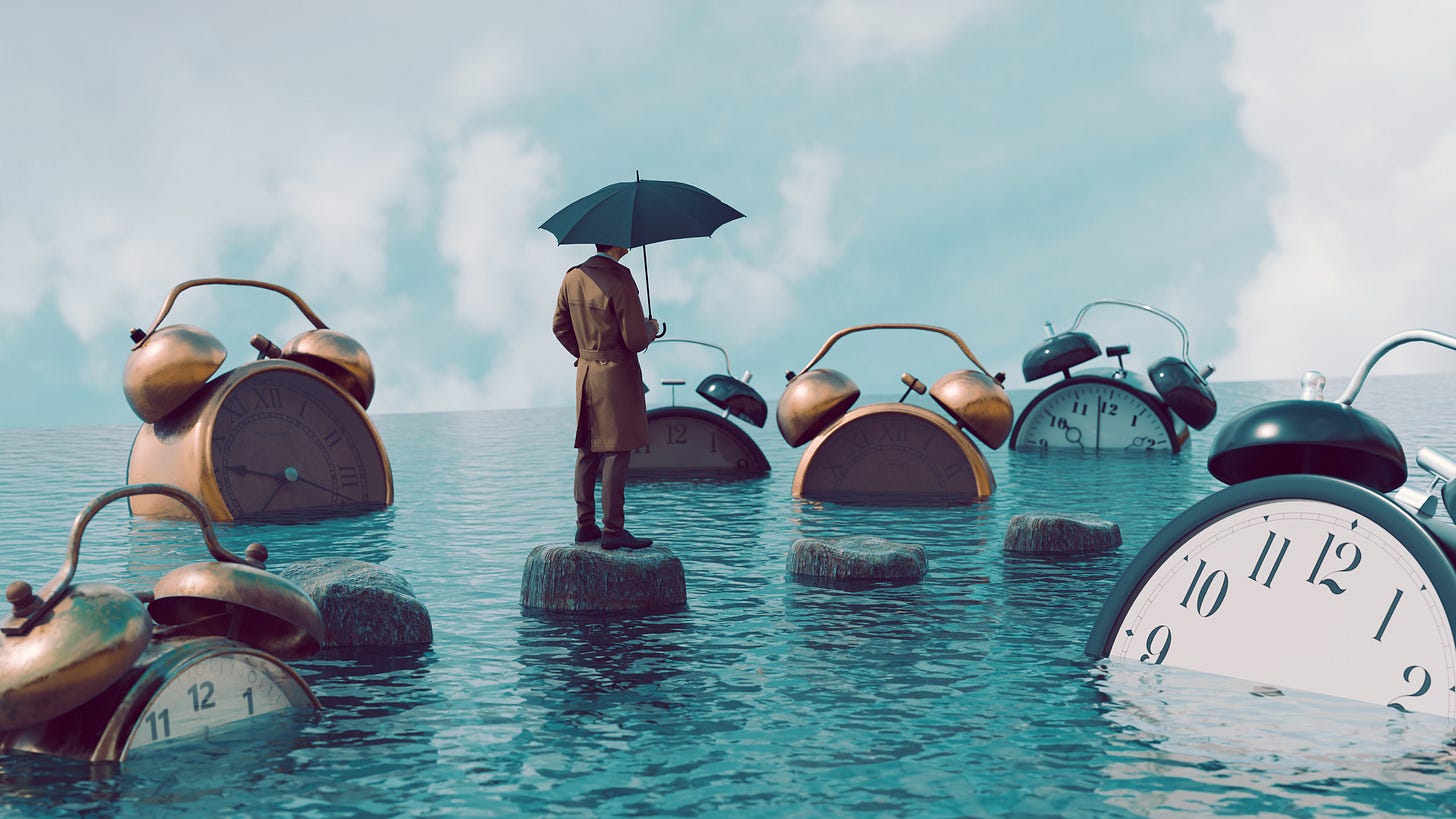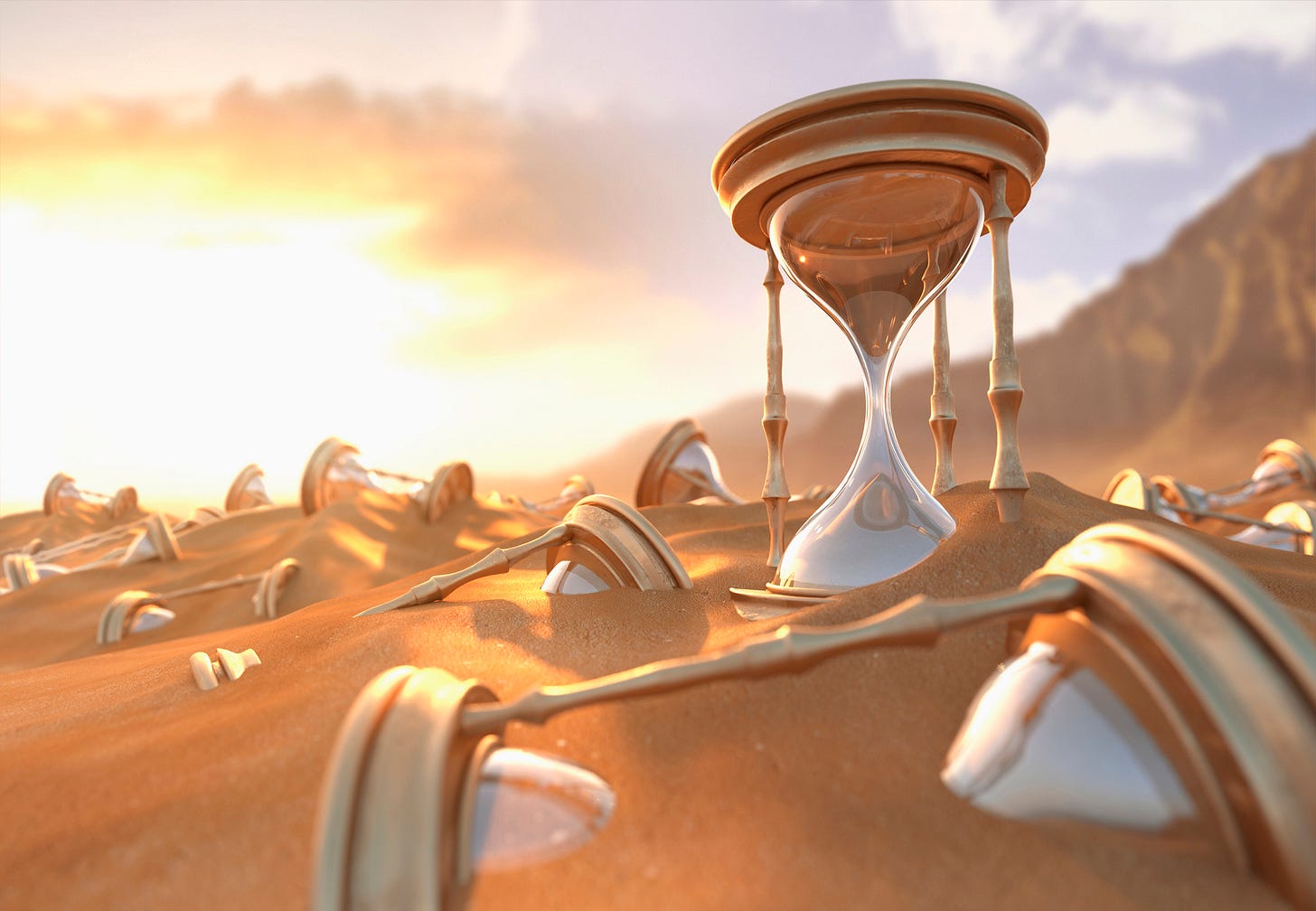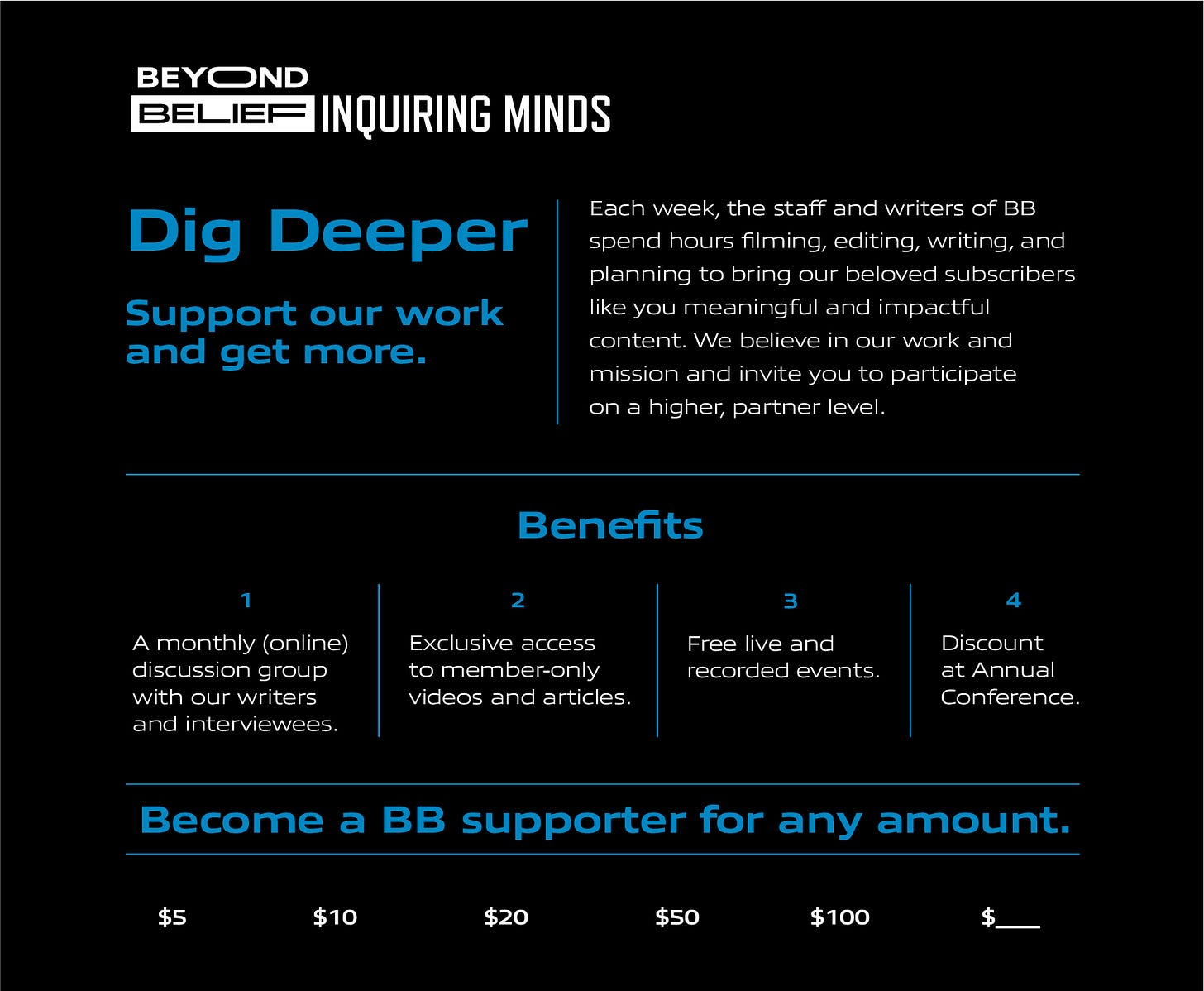The Peace of No Time
Learning how to live in eternity.
Time, why you punish me? Like a wave bashing into the shore. You wash away my dreams.
—Hootie and the Blowfish
Yesterday is history, tomorrow is a mystery, but today is a gift. That is why it is called the present.
—Master Oogway – Kung Fu Panda
Time is strange and malleable. We don't need Einstein to prove that to us. We experience time as relative, stretching out and contracting in, in myriad ways. The endless wait for summer when we were children, the flashing by of the night when we’re catching up with a dear friend we haven’t seen in years. This experiential or “psychological” time is contrasted with “clock” time, the objective, yet arbitrary, division of days into hours, minutes, and seconds. The type of time that makes us feel hurried and stressed.
The ancient Greeks, like in so many other ways, were privy to an understanding of these two senses of time, even creating two separate gods, Chronos and Kairos to depict them. Chronos is the god of objective clock time we are beholden to, who, forebodingly, ends up devouring his own children. Kairos embodies the brief, indescribable moment in which all things are possible, the time of true creativity. Kairos provides a qualitative rather than quantitative understanding of time, a chance to transcend our clock-time devotion.
We're all taught to believe that only clock time is real or at least that it’s the one to attend to in order to succeed in life. But is that true? What happens if we shift our focus to experiential time as more real and more valuable? Why allow our clocks to dictate our lives to the detrimental extent that we do, inviting Chronos to continue consuming us? Carlo Rovelli, one of the top physicists of our time writes in The Order of Time: "We usually conceive of time as something simple, fundamental, flowing evenly, from the past to the future, measured by clocks… All this has turned out to be false."
There’s an overwhelming amount of evidence that clock time is actually the illusory one. Understanding this, I believe, gives us the opportunity to step back and make a choice about which time we’d like to participate in. Experiential time is certainly much more interesting and calls out for experimenting with. Maybe we can manipulate time, speeding it up during discomfort, and expanding it during the more joyful periods. Even more interestingly, maybe our experimentation with experiential time can lead us to the place of “no time”.
Living out of time
I had a few glimpses of “no time” when I was young. Like when I was around 9 or 10 and my dad used to coach my youth baseball team. I wasn’t that good and so he put me out in the outfield. I didn’t mind, in fact, just the opposite. I loved being out there. In the summer the early evening sunlight would make the field glow with an ethereal light and I remember the feeling of being in that realm where the world seems to stop, fully content in my location on the earth. This wasn’t that good for the team when the ball was hit out in my direction and I was too late in returning back into clock time.
But I was too “blissed out” to let it get me down. That sensation happened other times too. When I used to go to a horseback riding summer camp, during nap time I would often find an excuse to leave the cabin and wander around the camp by myself. The silence of no kids or counselors was engulfing, the only sounds reaching my ears being the rustling of the oak tree leaves and the swishing of the horses' tails. Again, I was outside of time,
feeling as if the world was completely new and feeling like I could stay there “forever” and be utterly content. The notion of “forever’ or “eternity” was always a little confusing to me. I thought it meant a really, really, really long time. But it doesn’t mean that at all. Eternity means outside of the constraints of time. Constraints that are placed upon us by society and by the way our brains work. I had somehow arrived at eternity in those moments.
The sense of freedom and peace and bliss I had on the baseball field and at camp is perhaps a little easier to discover in childhood when the responsibilities in life are much less than they are later. For many decades I forgot about those ineffably beautiful eternal moments.
No time for “no time”
Through being in the world and of the world, going to college, and then graduate school, building a career as a neuroscientist at the University of California San Diego, my life was far from lacking responsibility. I had the standard stressors that come with academic positions in the current climate: needing to publish or perish, competing for grant funding, and mentoring students who were themselves often consumed by stress. Chronos was in charge. There was no time for “no time.”
It was during a particularly stressful period that my doctor, who I will forever be indebted to, “prescribed” a class on meditation called Mindfulness Based Stress Reduction for me to try. I jumped in having always wanted to learn to meditate but not really knowing how. I went into the class believing the only benefit I could obtain from learning to meditate was to reduce the stress in my life, an astounding benefit for sure, and one that I still can’t believe actually happened.
What I didn’t know was that I would end up discovering so much more, too much to fully describe here. But one of the more wonderful unforeseen outcomes that happened was the sudden ability to tap into what all the main spiritual traditions refer to as the eternal present, or the “now”.
I have one of those flashbulb memories of the first time I experienced that state. We had been practicing what’s called body scan meditation. Starting from our toes and moving slowly up to the top of our head the goal was to simply focus on each body part. It’s a practice of attending
without losing focus. When you do this, when you fully attend to something, the thoughts that are normally intruding into your mind slow down and ultimately stop. These thoughts, I came to discover, almost invariably concern some anxiety about the past or future, throwing us inexorably into the mouth of Chronos. I was lying there, really trying to focus, trying not to ruminate over something I said to a colleague earlier that day, or planning what I was going to make for dinner. Then the teacher said to us, “Be playfully curious about the space between your toes.” Smiling to myself, I did what he said.
Utter calm, peace, and bliss
All of a sudden, and seemingly miraculously, I was outside of time, in the space between thoughts. The best way I can describe the feeling I had at that moment was one of complete and utter calm, peace, and bliss, like that sensation on the ball field. It actually made me laugh out loud, it was such a novel feeling. I opened my eyes and noticed the subtle smile and nod from the teacher. At that point, I knew I had landed upon a great secret, one that I knew as a child but as an adult had forgotten.
That ability to enter into the place of no time has completely changed my relationship to everything else in my life. I started noticing strange differences immediately. Driving home after my class, I was shocked to discover that I was no longer an irritable, defensive driver. Just like that, I happily let others go ahead of me. I didn’t care how long it took me to get home. I was relishing the seemingly limitless space within me in which life was unfolding. I was freed from time and thus somehow freed from worry, angst, and anger.
Those drivers who were hurrying past, desperately trying to get someplace quickly, were no longer adversaries. On the contrary, I felt a deep connection to each one of them, sending them compassion and hoping that they could one day come to understand what I did. There is a much deeper place within every one of us that stands beyond time and is waiting for us to come home to. A place where love and joy rule. In this place, stress and anxiety can’t survive.
Escaping Chronos’s grasp opens the door to Kairos’s domain of peace and opportunity to live differently. Do your own experiment to try and find that place of no time and see what miracles it brings into your life and to those around you. It’s worth a shot.
Without inner peace, it is impossible to have world peace.
—Dalai Lama









This is such a timely (hopefully in a Kairostic sense) reminder for me. I've recently begun to feel the benefits of regular meditation too, and it seems like the next big hurdle for me to overcome is finally loosening the bear hug that Chronos has had me in for most of my life. So many of my bodily stress symptoms, I now realise, can be attributed to my inability to escape that bear hug. And the peace in those brief moments where I've managed to free myself is so liberating that it almost makes those years under Chronos worthwhile, just for the savour they add to that feeling of liberation.
I'm currently reading into Henri Bergson's ideas of Duration too, which is helping me to maintain an appreciation of Kairos time, and stumbling upon this post reassured me that my focus is where it should be right now. Thank you!
Thank you Laleh!
As a musician, I have often wondered whether our disciplined use of "Chronos" time actually serves as a portal to "Kairos" time. The underlying pulse, the beating heart of music--we musicians call it "meter"--and the overlay of rhythms, are strictly in the"chronos" domain. And yet, when we find the flow of music making in the moment, there is no time at all. Hours of practice can seem to last merely minutes, as do journeys through long symphonies (Anton Bruckner, for example). It is truly a state of being that is both holy and blissful.
Why? Because the ego goes silent.